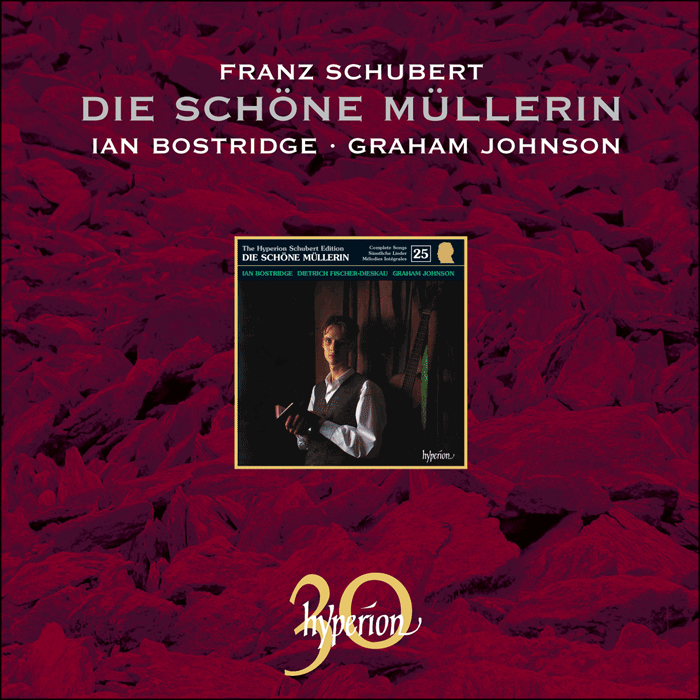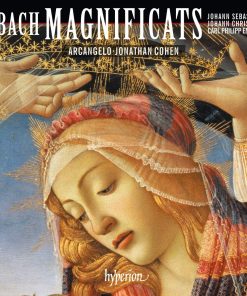SCHUBERT: DIE SCHONE MULLERIN – Ian Bostridge (tenor), Graham Johnson (piano) HYPERION
$ 10,00 $ 6,00

The readings
Müller’s cycle contains five more items than Schubert chose to set, and there is a sixth poem, Ein ungereimtes Lied, which Müller originally planned as part of the work and which we have restored to the sequence. In Der Dichter, als Prolog and Der Dichter, als Epilog the poet offers an apologia before and after the main body of the work in the form of speeches in front of the curtain. As well as these gently ironic and somewhat humorous pieces there are three sizeable poems, the first of which adds a great deal to our understanding of the miller-girl’s daily life (Das Mühlenleben), while the other two illuminate the despair of the boy towards the end of the work (Erster Schmerz, letzter Scherz and Blümlein Vergissmein). In this performance the poems are interpolated in Müller’s order. It is clear that Schubert’s music needs no prologue and epilogue to achieve its full effect, although the poems’ domestic origins as explained above are very much clearer when the cycle is heard framed by these readings. The composer missed out Das Mühlenleben to make the girl deliberately less characterized, thus more mysterious, and the two other poems, fascinating commentaries on the boy’s disturbed mental condition, were sacrificed to aid the dramatic tension of the whole and to conserve a tight structure as the cycle moves inexorably (at least it does with Schubert) to its conclusion. In live performance, reinstating the poems as readings would thus perhaps be questionable although preferable to performing the songs in the settings of the Stuttgart composer Ludwig Stark who quite happily placed his work alongside Schubert’s. On disc, however, the listener will be able to hear a much-recorded cycle from a new perspective. In any case the cycle can be heard uninterrupted by words by programming the player to skip the appropriate tracks.
The reader
Early plans for Dietrich Fischer-Dieskau to make a disc of songs for this series fell victim to a flood in the Siemens-Villa in Berlin where the recording was to have taken place. After that, logistics and the singer’s impending retirement prevented re-scheduling. Even without his participation as a singer it is unarguable that Fischer-Dieskau is one of the fathers of The Hyperion Schubert Edition: his ground-breaking Schubert recordings with Gerald Moore in the seventies gave us the courage to embark on an enterprise such as ours. Where he leads others have followed, and this has been a pattern throughout his life; for over forty years Fischer-Dieskau has dominated the world of Lieder. Apart from his example as a performing artist, countless programme planners owe to his song archive their knowledge of the repertoire available to them. Over the years he has built up a list of recordings which now makes an endlessly consulted encyclopaedia of the Lied. In his seventieth-birthday year, and in a new capacity as a reader, Dietrich Fischer-Dieskau adds the name of Hyperion to the recording companies with which he has been associated, a happy and fitting event for the Schubert Edition.
‘Another marvellous disc in an eminently collectable series’ (The Independent)
‘Ian Bostridge produces youthfully golden tone and gives an eagerly detailed account to match even the finest rivals’ (The Guardian)
‘The performance by the young Bostridge is a miracle … Vocally he is immaculate, singing with a shining lyricism that recalls Wunderlich, but he is infinitely more characterful than the great German tenor: he brings the naive, impetuous, jealous, ultimately despairing and suicidal boy vividly to life as no other tenor on record and his youthful vulnerability is heart-rending. This wonderful disc makes you listen to Schubert’s masterly cycle with refreshed ears. It’s destined for my Christmas list and, surely, for fistfuls of awards’ (The Sunday Times)
‘Graham Johnson could not have chosen more wisely from among the tenors available to him today’ (Fanfare, USA)
‘A particularly high point of achievement in the magnificent Hyperion Schubert Song Edition’ (Opera Now)

Die schöne Müllerin
1
No 1: Der Dichter, als Prolog Ich lad’ euch, schöne Damen, kluge Herrn[2’50]
Dietrich Fischer-Dieskau (reader)
Die schöne Müllerin D795[61’19]
2
Das Wandern Das Wandern ist des Müllers Lust[2’35]
3
Wohin? Ich hört’ ein Bächlein rauschen[2’30]
4
Halt! Eine Mühle seh’ ich blinken[1’32]
5
Danksagung an den Bach War es also gemeint[2’16]
6
Am Feierabend Hätt’ ich tausend[2’29]
7
Der Neugierige Ich frage keine Blume[3’56]
Die schöne Müllerin
8
No 8: Das Mühlenleben Seh’ ich sie am Bache sitzen[1’42]
Dietrich Fischer-Dieskau (reader)
Die schöne Müllerin D795[61’19]
9
Ungeduld Ich schnitt’ es gern in alle Rinden ein[2’38]
10
Morgengruß Guten Morgen, schöne Müllerin![4’00]
11
Des Müllers Blumen Am Bach viel kleine Blumen stehn[3’13]
12
Tränenregen Wir sassen so traulich beisammen[4’11]
Die schöne Müllerin
13
Additional poem: Ein ungereimtes Lied Kein Liedchen mehr![0’45]
Dietrich Fischer-Dieskau (reader)
Die schöne Müllerin D795[61’19]
14
Mein! Bächlein, lass dein Rauschen sein![2’23]
15
Pause Meine Laute hab’ ich gehängt an die Wand[4’30]
16
Mit dem grünen Lautenbande Schad’ um das schöne grüne Band[2’05]
17
Der Jäger Was sucht denn der Jäger am Mühlbach hier?[1’15]
18
Eifersucht und Stolz Wohin so schnell, so kraus und wild, mein lieber Bach?[1’36]
Die schöne Müllerin
19
No 18: Erster Schmerz, letzter Scherz Nun sitz’ am Bache nieder[1’39]
Dietrich Fischer-Dieskau (reader)
Die schöne Müllerin D795[61’19]
20
Die liebe Farbe In Grün will ich mich kleiden[4’05]
21
Die böse Farbe Ich möchte ziehn in die Welt hinaus[2’01]
Die schöne Müllerin
22
No 21: Blümlein Vergissmein Was treibt mich jeden Morgen[1’27]
Dietrich Fischer-Dieskau (reader)
Die schöne Müllerin D795[61’19]
23
Trockne Blumen Ihr Blümlein alle[3’51]
24
Der Müller und der Bach Wo ein treues Herze[3’56]
25
Des Baches Wiegenlied Gute Ruh’, gute Ruh’![6’17]
Die schöne Müllerin
26
No 25: Der Dichter, als Epilog Weil gern man schliesst mit einer runden Zahl[1’40]
Dietrich Fischer-Dieskau (reader)
Fast Shipping and Professional Packing
Due to our longstanding partnership with UPS FedEx DHL and other leading international carriers, we are able to provide a range of shipping options. Our warehouse staff are highly trained to pack your goods exactly according to the specifications that we supply. Your goods will undergo a thorough examination and will be safely packaged prior to being sent out. Everyday we deliver hundreds of packages to our customers from all over the world. This is an indication of our dedication to being the largest online retailer worldwide. Warehouses and distribution centers can be located in Europe as well as the USA.
Orders with more than 1 item are assigned processing periods for each item.
Before shipment, all ordered products will be thoroughly inspected. Today, most orders will be shipped within 48 hours. The estimated delivery time is between 3-7 days.
Returns
The stock is constantly changing. It's not entirely managed by us since we are involved with multiple parties such as the factory and our storage. The actual stock can fluctuate at any time. Please understand it may happen that your order will be out of stock when the order is placed.
Our policy is valid for 30 days. If you haven't received your product within 30 days, we're not able to issue either a return or exchange.
You are able to return a product if it is unused and in the same condition when you received it. It must also still remain in the original packaging.
Related products
MUSIC CD
MUSIC CD
MUSIC CD





















































